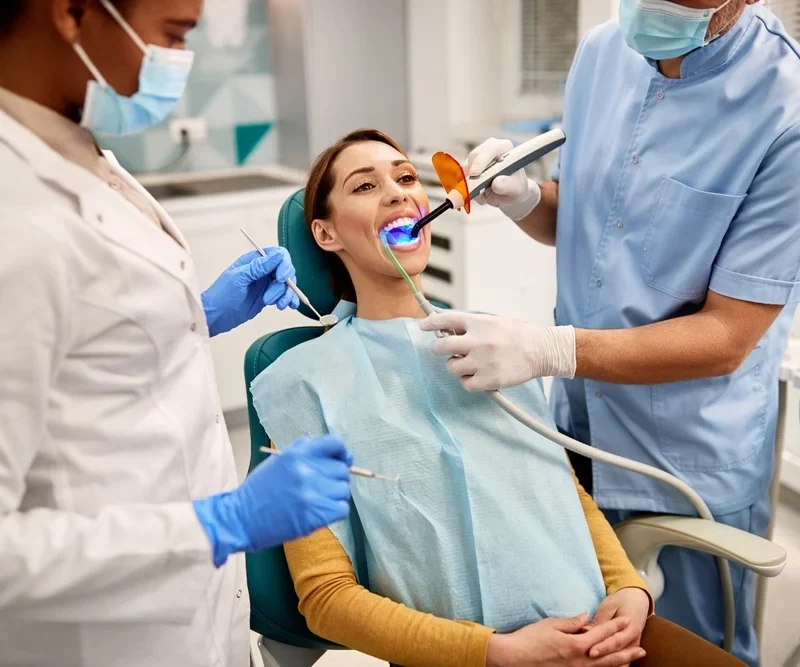Laser Dentistry San Antonio Tx
Enhance your oral health with our top notch laser dentistry, a key step towards a brighter, healthier smile.
The Role of Lasers in Dental Care
Dr. Chris Cappetta is dedicated to offering his patients cutting-edge dental care. One such advancement is laser dentistry, utilizing LightWalker ATS technology that has transformed many dental treatments, making them more comfortable and efficient for patients.
Dr. Cappetta is among the few dentists nationally certified in both hard and soft tissue laser treatments. With more than 35 years of clinical experience and advanced training, he provides precise care using this technology. Research indicates lasers may reduce healing time in certain gum procedures, though results can vary by patient.
Laser dentistry marks a new phase in dental care, providing a reliable, long-lasting, and highly effective option for various dental procedures. Dr. Cappetta’s certified proficiency in LightWalker ATS systems delivers minimally invasive treatments with faster healing times and enhanced patient comfort.
Take Our Dental Cost Survey
Estimate Your Dental Costs!
Want a better smile? Let’s help you estimate the cost! Take our quick cost estimator survey, and the team at Fountain of Youth Dental will find the right dental care for you. It’s your first step to a brighter, more confident smile!
The Benefits of Laser Dentistry
Laser dentistry technology in dentistry is a breakthrough, offering many key advantages:
- Minimally Invasive: Less tissue damage means faster healing and less discomfort.
- Reduced Pain: Generally, patients experience less pain and anxiety compared to traditional methods.
- Quick Recovery: Shorter recovery times allow for a quicker return to daily activities.
- Enhanced Precision: Lasers enable highly accurate treatments for better dental outcomes.
Research published in the National Library of Medicine confirms that dental lasers can be safely and effectively applied in a variety of dental treatments when used by trained professionals. Laser dentistry may not be suitable for all patients. Results vary by individual health needs. See our full disclaimer for details.
Laser Dentistry: What It’s Used For
Laser dentistry makes dental treatments easier and more comfortable. It’s great for treating gums, finding cavities early, and whitening teeth. Here’s how it helps:
- Gum Disease Treatment: Laser technology targets and removes infected gum tissue, fostering the growth of healthy gums.
- Snoring and Sleep Apnea: Early detection of dental contributors to snoring, enabling simpler, less invasive treatments.
- Root Canals: Enhanced comfort and effectiveness in root canal procedures through the use of laser technology.
- Teeth Whitening: Quicker, more efficient teeth whitening or cleanings with advanced laser methods, outperforming traditional techniques.
- Smoothlase & Liplase: Rejuvenation of face and lip collagen with cutting-edge treatments to diminish signs of aging.
According to the Academy of Laser Dentistry, dental lasers are safe and effective when performed by a trained professional.

Experience Expert Laser Dentistry
Ready for advanced dental care from a nationally certified laser dentistry specialist? Dr. Cappetta’s 35+ years of expertise and LightWalker ATS certification deliver results with minimally invasive treatments.
Schedule your consultation with one of the few dentists nationwide qualified in both hard and soft tissue laser procedures. Our established track record of successful cases and patient comfort ensures you receive the highest standard of modern dental care.
Book your appointment today and experience the difference that specialized training, advanced technology, and decades of clinical expertise make for your oral health.
What Best Describes Your Condition?
Explore how advanced laser dentistry can improve your oral health and confidence. Tell us what best describes your condition so we can help.
Take The QuizGetting started is as easy as…
Laser Dentistry
What procedures can be performed with laser dentistry?
Laser dentistry can be used for a variety of treatments, including gum reshaping, cavity detection, filling preparation, bacterial reduction during root canals, and even teeth whitening. Ask Dr. Cappetta, San Antonio’s premier dentist, if laser is right for you?
How much does laser dentistry cost?
Costs can vary depending on the procedure, but laser treatments may be comparable to or slightly higher than traditional methods. Some insurance plans may cover part of the cost.
Is laser dentistry painful?
Many patients find laser dentistry less painful than traditional methods. It often reduces the need for anesthesia and minimizes bleeding and swelling.
How safe is laser dentistry?
When performed by a trained professional, laser dentistry is considered safe. However, it may not be the best option for every patient or every procedure. Some treatments still require traditional methods, and mild side effects such as temporary sensitivity or swelling can occur. Your dentist will evaluate your individual needs before recommending treatment.
Are there any risks or limitations?
Laser dentistry is not suitable for all patients. Factors such as gum health, existing dental work, and overall oral condition can affect results. While many patients experience less discomfort, outcomes vary and traditional techniques may sometimes be necessary.

Contact Our Dental Office
Contact Us
Phone:
210-614-5481 (office)
Address:
5282 Medical Dr. #520
San Antonio, TX 78229
Office Hours
Monday – 9:00 – 5:00
Tuesday – 9:00 – 5:00
Wednesday – 9:00 – 5:00
Thursday – 9:00 – 5:00
Friday – 10:00 – 2:00
Saturday & Sunday – Closed
See More Reviews From Fountain of Youth Dental.
Dr. Chris Cappetta, DDS – Texas Dental License #14475

